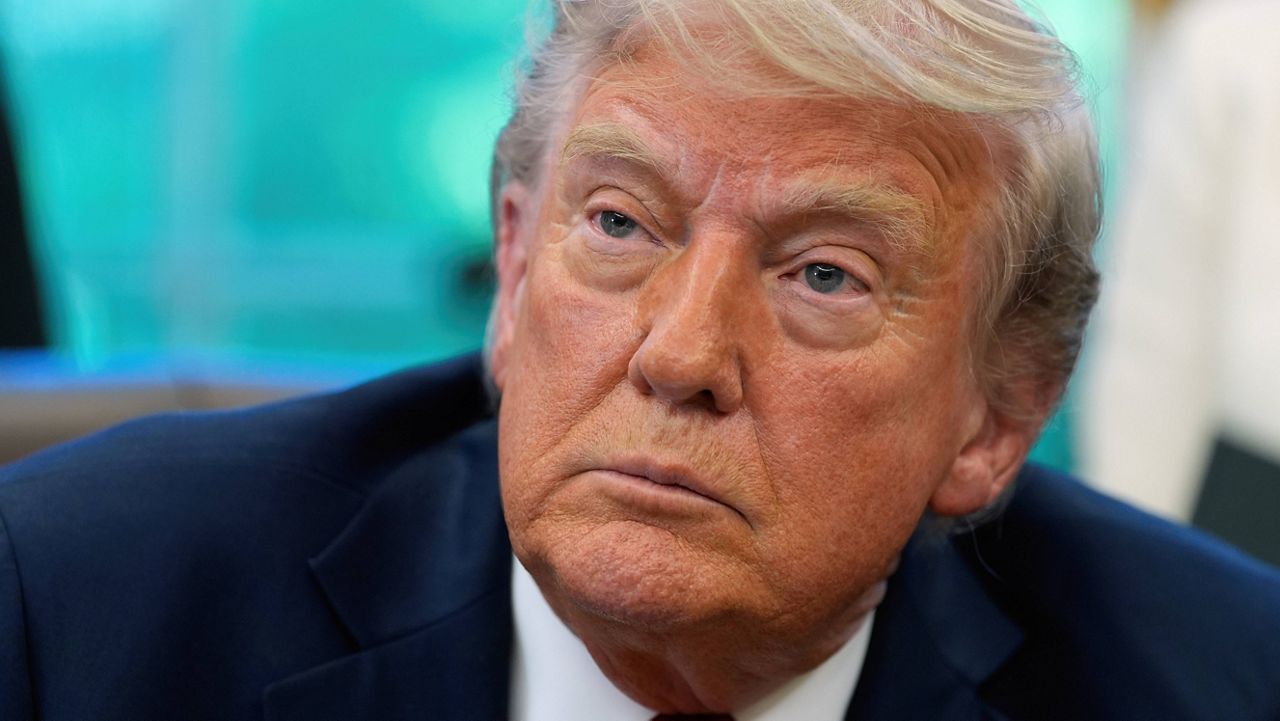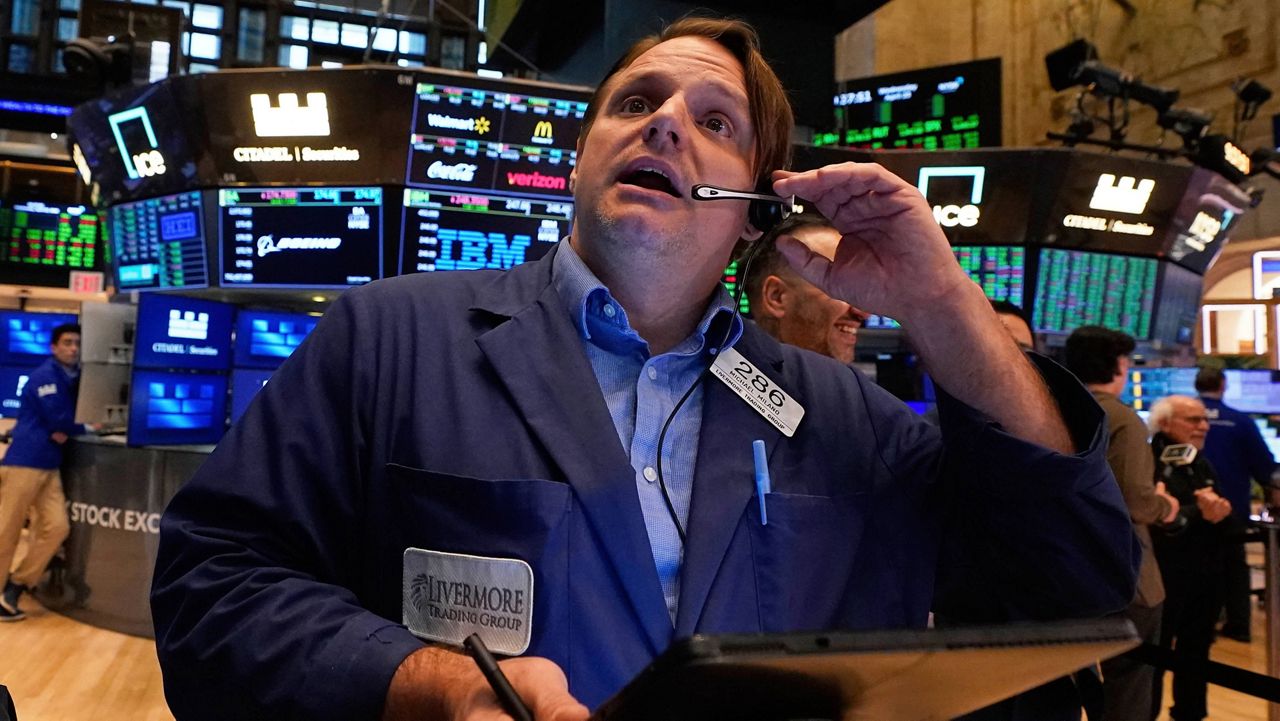The House of Representatives on Friday passed a sweeping climate, health care and tax bill, delivering President Joe Biden and Democrats a major victory on key social goals ahead of November's midterm elections.
What You Need To Know
- The House of Representatives on Friday passed a sweeping climate, health care and tax bill known as the Inflation Reduction Act, delivering President Joe Biden and Democrats a major win ahead of the midterms
- The roughly $740 billion measure includes the largest investment to fight climate change in U.S. history and allows Medicare to negotiate the prices on some prescription drugs; it also establishes a 15% corporate minimum tax on companies worth $1 billion or more, enhances IRS enforcement and introduces an excise tax on stock buybacks
- The bill passed in a 220-207 vote, with all Democrats voting to pass the bill, sending it to President Biden's desk without any Republican support
- Democrats are hoping that this bill – coupled with a string of recent victories on a bipartisan gun safety bill, a bill expanding health benefits for veterans exposed to toxins, a bill bolstering domestic chip manufacturing and boosting competitiveness with China and ratifying Finland and Sweden's bids to join NATO – can help them maintain, or grow, their narrow Congressional majorities
The bill passed in a 220-207 vote, with all Democrats voting to pass the bill, sending it to President Biden's desk without any Republican support. The measure passed through the Senate last weekend in similar fashion, with all 50 Democrats supporting the bill and all 50 Republicans opposed, forcing Vice President Kamala Harris to break the tie.
The roughly $740 billion measure includes the largest investment to fight climate change in U.S. history and allows Medicare to negotiate the prices on some prescription drugs. It also establishes a 15% corporate minimum tax on companies worth $1 billion or more, enhances IRS enforcement and introduces an excise tax on stock buybacks.
"Today, the American people won, and the special interests lost." President Joe Biden said in a video message posted to social media, echoing the White House's midterm message about victories over special interests. "Finally, with a final passage of the inflation Reduction Act, in the House of Representatives, the American people are going to see lower prescription drug prices, lower health care costs and lower energy costs, and big corporations are finally going to start to pay their fair share."
"Those that are paying $0 in federal income tax will now have to pay a minimum tax, and America is going to take the most aggressive action we've ever taken in confronting the climate crisis and strengthening the energy security of America and the world, quite frankly," the president continued.
"Big drug companies, they spent nearly $100 million to try to defeat this bill," Biden charged. "And yet every Republican in the Congress voted against the bill. Every single Republican, against lower prescription drug prices against lower health care costs against a fairer tax system against tackling the climate crisis, lower energy costs and good paying jobs. And by the way, in the process, we reduced the deficit as well."
"This is a historic moment," he continued. "The Democrats sided with the American people and the Republican side have a special interest. That's the choice we face. Whether we protect the already powerful or have the courage to build a future where everybody has an even shot."
"That's the America I believe in," Biden added. "And today, we've come a step closer to making that America real."
House Speaker Nancy Pelosi, D-Calif., hailed the bill, known as the Inflation Reduction Act, as a "robust cost-cutting package that meets the moment, ensuring that our families thrive and that our planet survives."
Cheers and applause broke out on the Democratic side of the House chamber once the bill had enough votes to pass. Friday's vote featured a rare show of unity: The entire Democratic caucus voting to pass the bill, with no defections, another victory for House Democratic leadership.
Pelosi said a press conference earlier Friday that the bill will work to address so-called "kitchen table" issues: "If you are sitting at your kitchen table and wonder how you're going to pay the bills, your health care bills, your prescription drug bills, this bill's for you."
"It finally enables Medicare ... to negotiate for the price of prescription drugs," she continued. "It prevents excessive price hikes. It caps out-of-pocket prescription drugs [at] $2,000, extends the Affordable Care Act subsidies for three years to lock in lower premiums that save 13 million people an average of $800 a year. And then it combats the climate crisis, cuts carbon pollution by 40%, creates 9 million good paying jobs and brings energy costs down from [roughly] $500-1,000."
But House Minority Leader Kevin McCarthy, R-Calif., railed against the measure, calling it "the largest tone deaf bill I've ever seen in this chamber in 232 years."
"I'm going to introduce a bill to rename this place fantasyland," McCarthy said on the House floor Friday, claiming that the bill will worsen inflation and harm American families.
The package that passed Friday is a much smaller compromise than the sweeping multi-trillion dollar effort that Democrats initially envisioned. The package appeared stalled after negotiations fell apart on the $1.7 trillion Build Back Better bill at the end of last year, but Senate Majority Leader Chuck Schumer and Sen. Manchin shocked the political world by announcing an accord on a bill that would pay down the deficit, introduce taxes on large corporations, lower health care costs and – most importantly for many progressives – make the biggest investment in U.S. history to combat climate change.
"This landmark legislation marks the largest ever federal investment in climate action, putting the United States back on track to cut carbon pollution by 40%, by 2030," Congressional Progessive Caucus chair Pramila Jayapal, D-Wash., said Friday at a press conference outside the Capitol.
Democrats are hoping that this bill – coupled with a string of recent victories on a bipartisan gun safety bill, a bill expanding health benefits for veterans exposed to toxins, a bill bolstering domestic chip manufacturing and boosting competitiveness with China and ratifying Finland and Sweden's bids to join NATO – can help them maintain, or grow, their narrow Congressional majorities.
“The next thing we need to do is hold the House, win a couple of seats in the Senate, so that we can become Manchin and [Arizona Sen. Kyrsten] Sinema-proof," said New York Rep. Jamaal Bowman, referring to the two moderate Democrats who forced the party to reduce the size and scope of the bill.
The bill's pillar is roughly $370 billion over 10 years to encourage industry and consumers to shift from carbon-emitting to cleaner forms of energy, hailed by experts as Congress' biggest climate investment ever. The bill also includes $4 billion added to cope with the West's catastrophic drought.
Among the climate benefits, the bill includes rebates on the purchase of energy efficient appliances for the next decade, a tax credit for homeowners of up to 30% of the value of big clean energy projects, like rooftop solar, and a $7,500 tax credit on the purchase of a new electric vehicle for Americans making less than $150,000 per year.
"We want every consumer to get everything they can out of this bill," White House national climate adviser Gina McCarthy recently told Spectrum News.
In a pair of top Democratic health priorities, another $64 billion would help 13 million people pay premiums over the next three years for privately bought health insurance. Medicare would gain the power to negotiate its costs for pharmaceuticals, initially in 2026 for only 10 drugs. Medicare beneficiaries' out-of-pocket prescription costs would be limited to $2,000 starting in 2025, and starting next year they would pay no more than $35 monthly for insulin, the costly diabetes drug.
The bill would raise around $740 billion in revenue over the decade, over a third from government savings from lower drug prices. More would flow from higher taxes on some $1 billion corporations, levies on companies that repurchase their own stock and stronger IRS tax collections. Around $300 billion would remain to defray budget deficits, a fraction of the period's projected total of $16 trillion.
According to an analysis from the Penn Wharton Budget Model, the bill will reduce inflation by 0.1% in the first five years, and would reduce deficits by $264 billion over the next decade.
Republicans say the legislation's tax hikes will force companies to raise prices, worsening the nation's bout with its worst inflation since 1981 that is wounding Democrats' election prospects. Nonpartisan analysts say the measure will have negligible inflation impact one way or the other.
"Just as you cannot drink yourself sober, you cannot spend your way out of inflation, or tax yourself out of recession, or borrow your way out of debt," said California Rep. Tom McClintock on the House floor Friday. "Yet, that's exactly Democrats claim they can do."
Echoing other culture war themes, the GOP has criticized initiatives like tax breaks for clean energy and electric vehicles as wasteful spending.
"If the Green New Deal and corporate welfare had a baby, it would look like this," said Rep. Kevin Brady of Texas, the House Ways and Means Committee's top Republican.
One member of the House GOP, Texas Rep. Chip Roy, threatened that Republicans should shut down the government next year in order to force Democrats to repeal the bill should they retake Congress.
"What Republicans ought to do – I would personally say that we should deny them a physical quorum today, I wouldn't even play their game today flying in here and having 175 people voting by proxy – but if this thing passes today, which I assume it will ... I would say we should defund all of these entities and we should commit to repealing this bill on day one if the American people give us the power and give us the control in the House," Roy said on Fox News on Friday.
"We should fight this with everything we have," he continued. "No more speeches, no more 'here's we're gonna do,' no more hearings, come in on day one and say 'we're gonna shut this government down, shut it down' until they stop going after the American people ," he added.
Republicans say Democrats' plan to expand the IRS budget, aimed at collecting about $120 billion in unpaid taxes, envisions 87,000 agents who'd be coming after families; the claim has been roundly debunked by fact-checkers. Democrats called foul, saying their $80 billion IRS budget boost would be to replace waves of retirees, not just agents, and to modernize equipment, and say families and small businesses earning below $400,000 annually would not be targeted.
The GOP also says the bill would raise taxes on lower- and middle-income families. An analysis by Congress' nonpartisan Joint Committee on Taxation, which didn't include the bill's tax breaks for health care and energy, estimated that the corporate tax boosts would marginally affect those taxpayers, partly due to lower stock prices and wages.
With on-and-off closed-door talks between Manchin and Senate Majority Leader Chuck Schumer, D-N.Y., seemingly dying, the two lawmakers shocked Washington and announced agreement last month on the new, pared-down package.
Manchin won billions for carbon capture technology for the fossil fuel industries he champions, plus procedures for more oil drilling on federal lands and promises for faster energy project permitting. Sinema also used her leverage for late concessions, eliminating planned higher taxes on hedge fund managers and helping win the drought funds.
Ryan Chatelain - Digital Media Producer
Ryan Chatelain is a national news digital content producer for Spectrum News and is based in New York City. He has previously covered both news and sports for WFAN Sports Radio, CBS New York, Newsday, amNewYork and The Courier in his home state of Louisiana.










